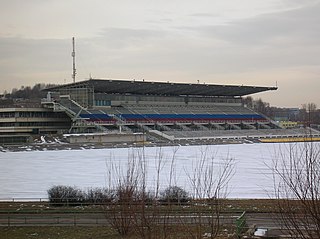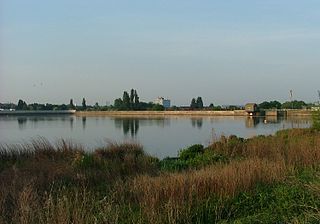Jana Sorgers is a German rower who was a dominant sculler of her time, starting her career for the East German rowing team and continuing after the German reunification for the combined Germany for a few more years. Between 1986 and 1996, she won two Olympic gold medals, seven world championship titles, and nine national titles. Upon the conclusion of her successful career, she was awarded the Thomas Keller Medal by the International Rowing Federation (FISA) – the highest honour in rowing.

Harald Jährling is a German rower who competed for East Germany in the 1976 Summer Olympics and in the 1980 Summer Olympics.
Ilona Richter is a German rower who competed for East Germany in the 1976 Summer Olympics and in the 1980 Summer Olympics, winning gold at both occasions.
Marina Wilke is a German rowing cox who competed for East Germany in the 1976 and 1980 Summer Olympics.

Kirsten Wenzel is a rowing cox who represented East Germany.

The 1973 European Rowing Championships were rowing championships held at the regatta course on the Krylatskoye Rowing Canal in Moscow, Soviet Union. The competition was the first use of the venue. There were seven competitions for men and five for women. World Rowing Championships were held, up until 1974, at four-year intervals, and the European Rowing Championships were open to nations outside of Europe and had become to be regarded as quasi-world championships. From 1974 the world championships changed to an annual schedule, and the European Rowing Championships were discontinued. It was only in 2006 that the International Rowing Federation (FISA) decided to re-establish the European Rowing Championships, with the 2007 event the first regatta after the hiatus.
The 1961 European Rowing Championships were rowing championships held on the Vltava (Moldau) in the Czechoslovakian capital Prague. The event for women was held from 18 to 20 August, and 9 countries competed with 32 boats. The event for men was held from 24 to 27 August, and 20 countries entered boats. Men competed in all seven Olympic boat classes, and just three countries entered boats in all classes: the hosts Czechoslovakia, the Soviet Union, and a combined German team. Women entered in five boat classes. The regatta was held in five lanes, with rowers proceeding in the direction of the river's flow.

The 1962 European Rowing Championships were rowing championships held on the Langer See in the East Berlin suburb of Grünau in East Germany; the venue had previously been used for the 1936 Summer Olympics. This edition of the European Rowing Championships was for women only and was held from 17 to 19 August. Eleven countries contested five boat classes. Men would three weeks later meet in Lucerne for the inaugural World Rowing Championships.

The 1964 European Rowing Championships were rowing championships held on the Bosbaan regatta course in the Dutch capital Amsterdam. Women competed from 31 July to 2 August. Men competed the following week from 6 to 9 August. Men competed in all seven Olympic boat classes, and women entered in five boat classes. Many of the men competed two months later at the Olympic Games in Tokyo; women would first be allowed to compete at Olympic level in 1976.

The 1968 European Rowing Championships were rowing championships held on the Grünau Regatta Course in the East Berlin suburb of Grünau. This edition of the European Rowing Championships was for women only and was held from 16 to 18 August. Twelve or fifteen countries contested five boat classes, and 39 teams competed. Despite the European label of the event, it was open to any country and was regarded as unofficial world championships, but all contesting countries in 1968 were from Europe. The men would meet in Mexico City in mid-October at the 1968 Summer Olympics.

The 1960 European Rowing Championships were rowing championships held on the Welsh Harp Reservoir in the London suburb of Willesden in England. This edition of the European Rowing Championships was for women only and was held from 12 to 14 August. Twelve countries contested five boat classes. Men would compete later that month in Italy for the 1960 Summer Olympics.
Renate Boesler, also referred to as Bösler and later as Gunkel, is a retired East German rower who won medals at European championships between 1963 and 1971. During that time, she became European Champion four times in two different boat classes.
Gerd Sredzki is a rower who competed for East Germany. He was twice world champion in the eight event.
Bernd Frieberg is a rower who competed for East Germany.
Marion Rohs is a rower who competed for East Germany in the 1970s.
Bärbel Bendiks is a rower who competed for East Germany in the 1970s and early 1980s.
Katja Rothe is a rower who competed for East Germany in the 1970s.
Christine Röpke is a rower who competed for East Germany during the 1970s.
Hartmut Buschbacher is a German rowing coach. As a rower, he represented East Germany.
Barbara Müller, is a rower who represented East Germany in the 1960s. She was later a rowing coach for SG Dynamo Potsdam.






